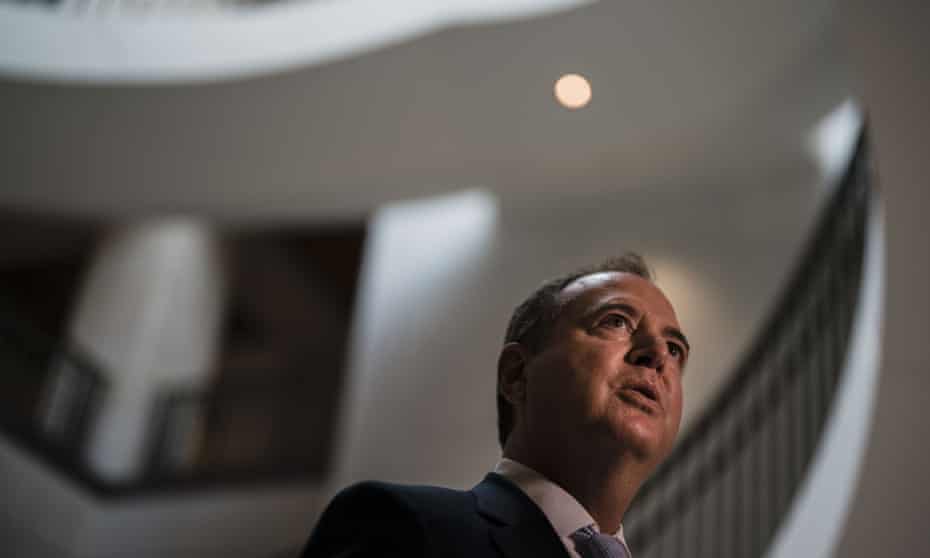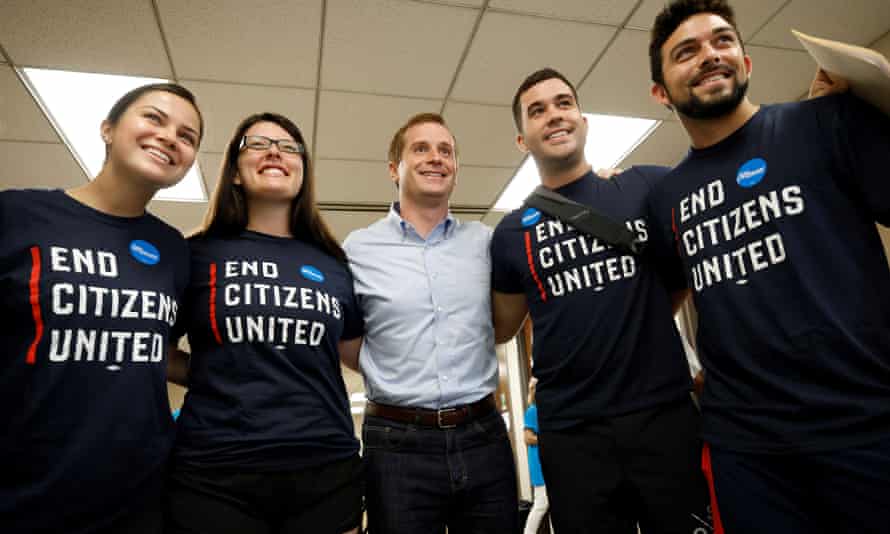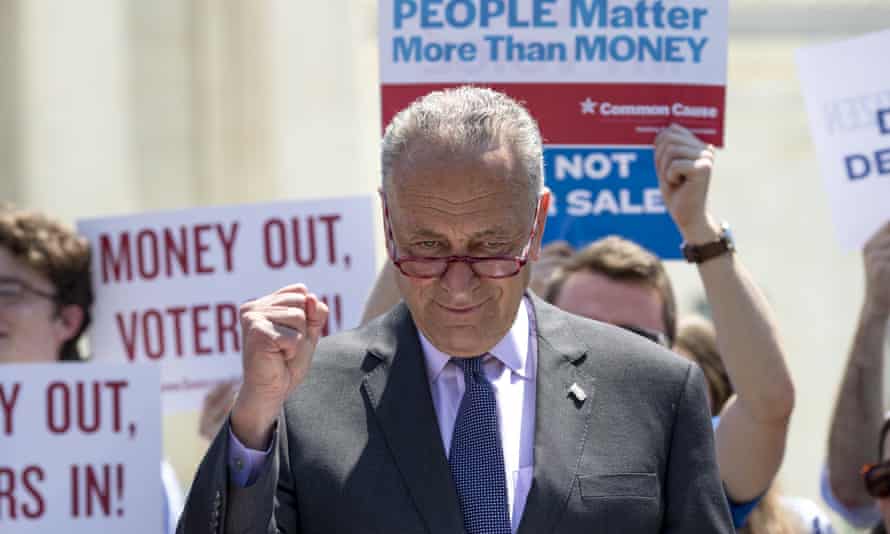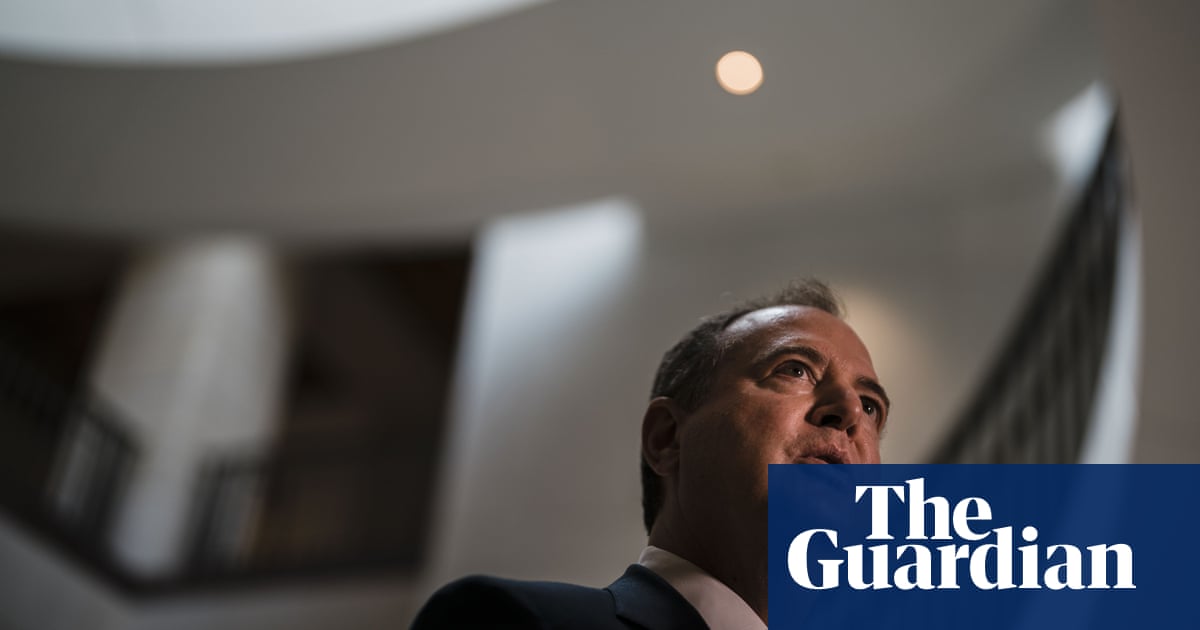Dark money: the quixotic quest to clean up US campaign financing

The supreme court’s 2010 Citizens United decision opened the floodgates for special interests to pour money into elections. Could a constitutional amendment be the answer?
It would, activists testify, restore the public’s waning trust in vital US institutions, curb the corrupting influence of big money in politics and give America’s ailing democracy a much-needed shot in the arm.
It is also, they acknowledge, dead on arrival.
An amendment to the US constitution was last week proposed by Congressman Adam Schiff to overturn a 2010 precedent set by the supreme court, known as Citizens United, which opened the floodgates for corporations and special interests to pour billions of dollars into election campaigns.
Passing the amendment would, Schiff argues, enable Congress or individual states to propose reasonable limits on private campaign contributions and independent expenditures. “Let’s get dark money out of our democracy,” he tweeted. “And return power to the people.”
Such a move has broad public support in America but little chance of getting through Congress itself. Amending the constitution requires support from a two-thirds majority in both the House of Representatives and Senate plus ratification by three-quarters of state legislatures.
In today’s polarised America, where few Republicans have displayed an appetite for campaign finance reform, that remains a non-starter. Democrats including Schiff himself have made previous attempts at constitutional amendments and got nowhere. Citizens United appears to be here to stay.
Its origins lie in a challenge to campaign finance rules by Citizens United, a conservative non-profit group, after the Federal Election Commission refused to allow it to broadcast a film criticising candidate Hillary Clinton too close to the Democratic presidential primaries.
In one of the most controversial decisions in its history, the supreme court ruled 5-4 in Citizens United’s favor with Justice Anthony Kennedy writing that limiting “independent political spending” from corporations and other special interest groups violates the first amendment right to free speech.
It opened the way for them to spend unlimited money on election campaigns. In the 12 years since, outside groups have spent more than $4.4bn in federal elections – almost $1bn of which was “dark money”, typically through non-profits that do not disclose their donors. The biggest contributors have included banks, the pharmaceutical industry and the National Rifle Association (NRA).

“Citizens United has been a disaster for the American political system even beyond what we expected,” said Noah Bookbinder, president of Citizens for Responsibility and Ethics in Washington (Crew) “We knew it was bad when it happened but the amount of money going into the political system has exploded since that decision, including a massive expansion in third-party spending, particularly unaccountable dark money spending.”
The supreme court’s majority opinion in 2010 had assumed that outside spending would be inherently transparent and free from corruption. It has been proven wrong, Bookbinder argues, as the money is funneled through non-profits or shell corporations that conceal its origins.
“So much of that money comes from sources that are difficult or impossible to identify. The public doesn’t know who’s responsible for this money in American politics. It’s been catastrophic and it does need to be fixed.”
This, campaigners say, has had a corrosive effect on democracy and explains why politicians who benefit from the money so often fail to tackle healthcare reform, gun control, the climate crisis and other urgent issues.
Bookbinder added: “It certainly does give more power to powerful interests like the fossil fuel companies, the drug companies, the major banks and all the biggest money industries as well as individual billionaires who can put a great deal of money into the political system, often in ways that the public doesn’t know about but that elected officials do know about and feel beholden to.
“That’s a real problem. When you see a lack of progress on issues like climate change, how much of that is due to the fact that so many elected officials are beholden to powerful figures connected to industries that don’t want progress?”
This, in turn, feeds public frustration with Washington a place where nothing gets done except measures that favour the rich and powerful – a recipe for voters to turn to outsider candidates such as Donald Trump who promise to shake up the system and “drain the swamp”.
Bookbinder said: “The other piece that is really dangerous is that the American people understand that there is so much money going into politics from very wealthy people and from industries and they feel like the democracy is not working for them.
“It makes people lose their faith in democracy and become more willing potentially to either support leaders who don’t believe necessarily in democracy – we’ve seen that in recent years – or to be less concerned with defending the democracy from threats. That’s another way in which it can be kind of existential in the effect that it has.”
Pacs (political action committees) raise and spend money for campaigns that support or attack political candidates or legislation. Pacs are allowed to donate directly to a candidate’s official campaign but subject to limits on what contributions they can give or receive.
In the wake of Citizens United, however, a federal appeals court ruled that outside groups could accept unlimited contributions as long as they do not give directly to candidates. These Super Pacs are allowed to spend money to endorse or oppose candidates with adverts that are produced independently.
But Karen Hobert Flynn, president of the democracy reform group Common Cause, said: “The reality since that decision shows that it is not necessarily independent – we see lots of coordination between candidates and Super Pacs – and it causes enormous damage to our imperfect democracy where wealthy mega-donors, corporations, special interest groups not only impact and influence elections but, once elected, lawmakers feel like they need to grant favours for those who funded their campaigns.”

Super Pacs are obliged to disclose their donors but these can include non-profits which make the original source of the money hard to track. More than 2,000 Super Pacs operated in each of the last two election cycles.
The negative consequences have been felt not only in Washington but at state level, added Flynn, whose long fight for campaign finance reform in Connecticut bore fruit in 2008. “It has created a huge amount of cynicism that Congress and state legislatures are corrupt because they benefit from outside groups spending money on their behalf and that people’s voices do not matter.
“The money has also led to further polarisation, driving more extreme kinds of measures, particularly on the right where we’ve seen money supporting those who want to overturn a fair and free election. If you look at the top 10 Super Pacs and their outside spending so far just in 2022, you’ll see nine out of the top 10 Super Pacs are conservative or support Republican candidates. It isn’t like, ‘Hey, both sides do it and it’s equal and it’s not a problem.’”
Super Pacs are not all-powerful. Jeb Bush enjoyed their backing to the tune of $100m in 2016 but was defeated for the Republican nomination by Donald Trump’s improvised insurgent campaign. Everyone from Trump to Bernie Sanders to Marjorie Taylor Greene has shown the potency of small donations.
And Congress could still take action. Its recently proposed Freedom to Vote Act would have ensured that Super Pacs are truly independent and illuminated “dark money” by requiring any entity that spends more than $10,000 in an election to disclose all major donors.
But the legislation stalled in the evenly divided Senate after Democrats Joe Manchin and Kyrsten Sinema rejected efforts to reform a procedural rule known as the filibuster, which would have enabled their party to thwart Republican opposition. A dark money group had run a $1m ad campaign in Manchin’s home state of West Virginia to pressure him to keep the filibuster intact.
For critics of Citizens United, it was back to the drawing board once more. Rio Tazewell, director of strategy at People for the American Way, said: “Unfortunately there are very limited options in terms of what can be done. The supreme court could decide to weigh in on another case and reverse itself; given the current makeup of the court for the foreseeable future, that does seem unlikely.”
But Tazewell noted that 22 states and more than 830 municipal localities have passed resolutions supporting a constitutional amendment to overturn Citizens United. “There’s a lot of pressure building and coalition building that’s happening so that we can ultimately get the type of bipartisan support that we probably will need to pass an amendment,” he added.
“Ultimately, I think the most realistic solution – and possible, perhaps not overnight – is for there to be somewhat of a sea change at the national level and a greater recognition that this is not and should not be a partisan issue.”

